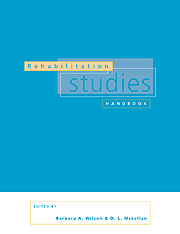Book contents
- Frontmatter
- Contents
- List of contributors
- 1 Introduction to rehabilitation
- 2 Disabled people in society
- 3 Disability equality training
- 4 Towards a therapeutic alliance model of rehabilitation
- 5 Rehabilitation education: a learner-centred approach
- 6 Work, occupation and disability
- 7 Management in rehabilitation
- 8 Research and evaluation in rehabilitation
- 9 Statistical methods
- 10 Social policy, disability and rehabilitation
- 11 Principles of the acquisition of sensorimotor skills
- 12 Management of acquired cognitive disorders
- 13 Challenging behaviour: helping people with severe brain damage
- 14 Pain
- 15 The multiply handicapped child
- 16 The transition to adult life
- 17 Factors specific to disabled elderly people
- Index
2 - Disabled people in society
Published online by Cambridge University Press: 06 November 2009
- Frontmatter
- Contents
- List of contributors
- 1 Introduction to rehabilitation
- 2 Disabled people in society
- 3 Disability equality training
- 4 Towards a therapeutic alliance model of rehabilitation
- 5 Rehabilitation education: a learner-centred approach
- 6 Work, occupation and disability
- 7 Management in rehabilitation
- 8 Research and evaluation in rehabilitation
- 9 Statistical methods
- 10 Social policy, disability and rehabilitation
- 11 Principles of the acquisition of sensorimotor skills
- 12 Management of acquired cognitive disorders
- 13 Challenging behaviour: helping people with severe brain damage
- 14 Pain
- 15 The multiply handicapped child
- 16 The transition to adult life
- 17 Factors specific to disabled elderly people
- Index
Summary
Can there be an objective measure?
It is fatally easy to fall into the trap of talking as if there were some ‘correct’ number of disabled people in a country. It is natural enough for concerned people, members of healing professions, politicians and others who have to provide resources and services to want a target figure at which to aim. They want simple answers to questions such as ‘how many people need hearing aids, or wheelchairs, or special education or adaptations to their homes’? Once they have such numbers they can attempt to meet the ‘demand’ thus quantified.
Part of this chapter will indeed discuss these kinds of estimates, but at best they are approximations and at worst they can be misused to give a rather spurious statistical basis to arguments about the needs of individuals and the adequacy or inadequacy of service provision. Moreover, there is a school of thought among some disabled people which holds that such calculations imply a philosophy which overlooks the extent to which social customs and inadequate facilities create handicaps for people with impairments. They even use the word ‘oppression’ to describe the restricting effects of some features of social organisations (Oliver, 1986; Abberley, 1987; Bynoe et al.9 1991).
Computations about numbers of people with disabilities inevitably rest on a whole series of assumptions and definitions. People fall into two broad categories: those who in some way identify their own disability and those identified by others. Self-identification starts from individual perceptions of impairment about which the person feels strongly enough to consult someone else, say a teacher, a psychologist or a doctor, about it.
- Type
- Chapter
- Information
- Rehabilitation Studies Handbook , pp. 21 - 44Publisher: Cambridge University PressPrint publication year: 1997



